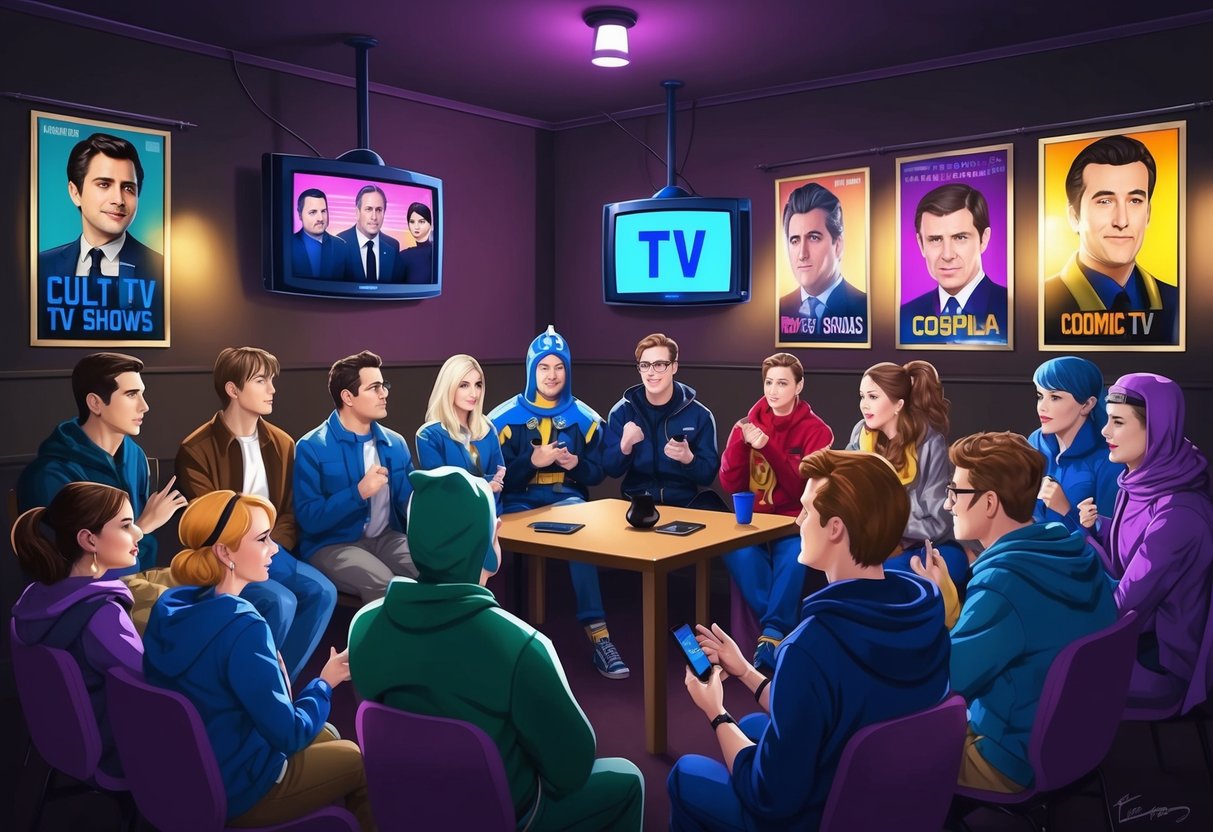
Not every TV show on air builds a loyal audience that stands the test of time. Some series attract a remarkably devoted following that turns them into enduring cult favorites.
These shows draw viewers in with their unique storytelling and unforgettable characters. They often have a quirky sense of humor or style that sets them apart from mainstream programming.
From offbeat comedies and dramas to genre-defining science fiction and animated hits, these cult TV shows have maintained loyal fanbases long after their original broadcasts. Shows like “Doctor Who,” “Pushing Daisies,” and “Archer” frequently appear on lists of cult TV classics thanks to their lasting impact and dedicated viewership.
Whether it’s the surreal storytelling of “Pushing Daisies” or the animated satire of “Archer,” these titles have achieved a rare status. Fans keep coming back for rewatches, fan theories, and conventions dedicated to celebrating their favorite shows.
What Defines a Cult TV Show?

Cult TV shows are set apart by the passion of their fans and inventive storytelling. Communities often develop around these series.
These shows often break from the mainstream, capturing long-lasting attention through unique narratives. Devoted audiences help them stand out.
Characteristics of Cult TV Series
Cult TV series are marked by highly dedicated fanbases that persist even after a show ends. Loyalty often keeps lesser-known or canceled programs alive through fan forums, conventions, and social media groups.
Such shows frequently have unconventional themes, sometimes blending genres or challenging traditional storytelling norms. For example, cult favorites like “Buffy the Vampire Slayer” and “Veronica Mars” gained devoted followers for their originality and complex characters.
A key trait is that cult series may not have originally been commercially successful. Instead, they find enduring popularity through nostalgia, repeated viewings, and lasting cultural impact.
Typical features include quirky or subversive humor, iconic settings or themes, and memorable dialogue. Recurring symbolism or motifs are also common.
The Role of Storytelling in Cult Popularity
Storytelling drives the popularity of cult TV shows. These series often offer intricate plots, character development, and layered themes that invite viewers to dig deeper and discuss theories online.
A strong narrative arc, often spanning multiple seasons, allows fans to invest emotionally and form lasting attachments to the story and its characters. This complexity differs from more episodic, standalone shows, encouraging binge-watching as audiences catch every nuance.
Writers behind cult titles usually take creative risks, experimenting with genre mashups, time jumps, or unconventional episode structures. Examples include the surreal humor of “Arrested Development” and the genre-bending drama of “Buffy the Vampire Slayer.”
Impact of Fandom and Community
The influence of fandom is crucial to a show’s cult status. Cult following communities often create fanfiction, artwork, and memes, further entrenching the show’s impact and visibility online.
Live discussions, fan theories, and rewatch parties encourage new viewers to join and old fans to return. Community-driven campaigns can revive interest, sometimes even leading to sequels, movies, or revivals long after cancellation.
Online platforms like Reddit provide active spaces for cult TV communities to gather and share insights, as seen with ongoing discussions of Dropout shows. In-person conventions bring fans together, reinforcing the sense of belonging that is central to the cult phenomenon.
Honorable Mentions: Iconic Cult Series
Some TV shows leave a lasting impact on popular culture, gaining devoted audiences and influencing later works. These series may not always reach mainstream status, but their influence, unique style, and dedicated followings make them noteworthy.
Pioneers in Science Fiction and Horror
Classic sci-fi and horror anthology shows like The Twilight Zone and The Outer Limits stand out as trailblazers. The Twilight Zone blended supernatural oddities and moral dilemmas, influencing decades of genre storytelling and challenging viewers with thought-provoking narratives.
Its iconic twist endings are still referenced today. The Outer Limits, with its eerie tone and speculative science plots, continued this tradition, offering imaginative episodes that often explored the boundaries of technology and ethics.
Steven Spielberg’s Amazing Stories took inspiration from these earlier programs. Premiering in the 1980s, the show infused Spielberg’s cinematic flair into TV with tales that mixed wonder, suspense, and occasional horror.
Meanwhile, Night Gallery—created by Rod Serling after The Twilight Zone—presented macabre stories and unsettling artwork, which appealed to fans of supernatural suspense. Many viewers credit these series with paving the way for modern anthologies and genre shows.
They provided an early showcase for sci-fi, fantasy, and horror on television. These shows helped spark the cult status of other boundary-pushing programs over the decades.
Learn more about how The Twilight Zone and others have stayed popular among cult TV fans at Ranker’s list of cult TV classics.
Underappreciated Sitcoms
Certain sitcoms with niche audiences have built passionate fanbases despite lower ratings or network challenges. Arrested Development is a prime example—its intricate running gags and unique character humor attracted critical acclaim, but also led to cancellation before later revival and increased cult popularity.
Better Off Ted follows a similar path. Set in an absurd corporate environment, it satirized office culture and technology with sharp writing and quirky performances.
These underappreciated sitcoms are famous for clever storytelling, meta jokes, and dedicated communities that keep their legacy alive through memes and online discussions. Their fans often cite the smart humor and rewatchability as reasons for their enduring appeal, even years after their original run ended.
You can see more shows like Arrested Development and Better Off Ted among the top cult TV comedies listed by Entertainment Weekly.



